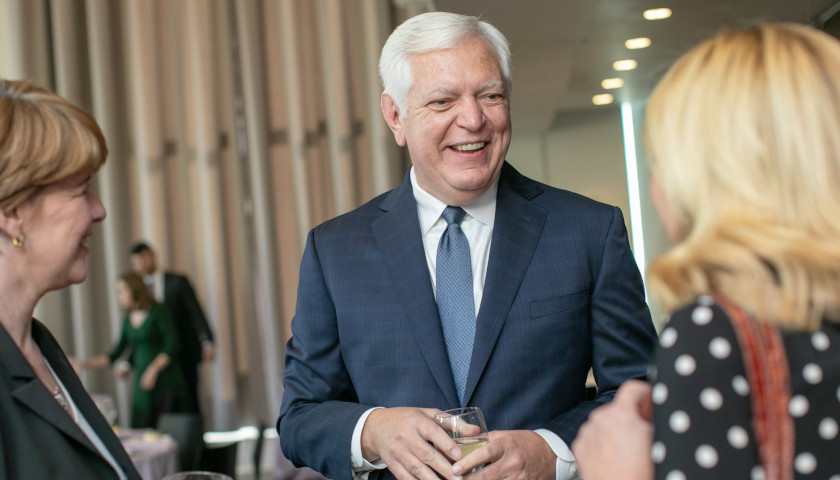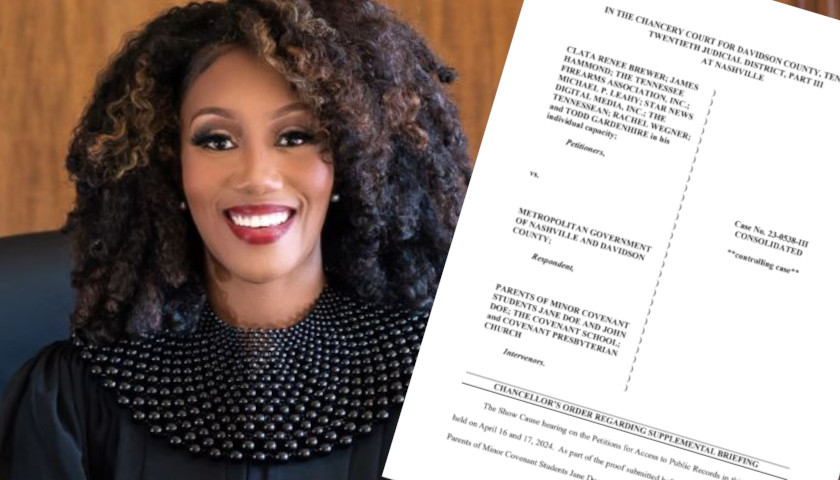On Tuesday’s Tennessee Star Report with Michael Patrick Leahy – broadcast on Nashville’s Talk Radio 98.3 and 1510 WLAC weekdays from 5:00 am to 8:00 am – host Leahy welcomed good friend and professor of law at Georgetown University, Randy Barnett to the show to discuss his new book, An Introduction to Constitutional Law, 100 Supreme Court Cases Everyone Should Know.
Towards the end of the segment, the men discerned components of constitutional law’s bad cases and good cases and also why constitutional law is important for everyone to know not just law students.
Leahy: On with the phone with us now, a good friend and one of the greatest constitutional law professors in the land. Georgetown Law School professor Randy Barnett. Welcome to The Tennessee Star Report, Professor Barnett.
Barnett: It’s great to be here and thanks for having me.
Leahy: We’ve been friends for well over a decade now. We first got to know each other when I called you up out of the blue over ten years ago when I had a little program on PJTV and you wrote an outstanding article in the Wall Street Journal that caught my attention. And I guess from that came a series of articles regarding the Bills of Federalism. You may recall that.
Barnett: I do. And it was you that got me so involved with the Tea Party. I had written a piece about the Tea Party and what the Tea Party ought to be for if they wanted to be for something affirmative. And you followed up. And after that, I had an awful lot of contact with an awful lot of Tea Party people which I really really enjoyed.
Leahy: We site your works extensively in our little Guide to the Constitution and the Bill of Rights for Secondary School Students. I have to read this quote. One of my favorite quotes ever from your 2004 book, Restoring the Lost Constitution, the Presumption of Liberty.
“The constitution that was actually enacted and formally amended creates islands of government powers in a sea of liberty.” Love that quote. The problem now is, who are the islands and what is the sea right? (Leahy chuckles)
Barnett: Right. right. I took that quote from a Princeton professor named Steve Macedo. He wrote that the constitution creates islands of power in a sea of liberty. But what we now have is a constitution of islands and liberty in a sea of power.
Leahy: Exactly. And that’s the issue, isn’t it? You have a new book coming out and we want to talk about that right now. A new book and a series of videos which by the way are excellent. You gave me an opportunity to look at them and they’re very interesting.
Your new book is An Introduction to the Constitutional Law, 100 Supreme Court Cases Everyone Should Know. And you have co-authored that book with an up and coming professor of law at the University of South Texas College of Law. Josh Blackman right?
Barnett: Right. So my first book on the constitution that you just mentioned, Restoring the Lost Constitution is about originalism. Why we should be originalists. And the original meaning of various parts of the constitution like the commerce clause and other things.
My second book, my last book Our Republican Constitution, Securing the Liberty and Sovereignty of We the People. Was about the role of judges in a constitutional republic and how they let us down in the Obamacare case and how we ought to demand judges who are prepared to enforce the constitution.
This is a book about constitutional law. It’s not a book about the original meaning of the constitution although of course, that’s in there as well. It’s primarily about supreme court cases that make up constitutional law that put into effect what the constitution says. And this is about what the supreme court has actually said in its famous cases. The 100 Supreme court cases that everyone should know.
Leahy: Well you know we, in our The Guide to the Constitution for Secondary School Students we talk about the concept of judicial review. And many of these cases we write about in the book and the kids talk about. What I found so fascinating is the way you’ve put this together. the way you’ve selected these 100 cases.
Some of them Dread Scott and people are well familiar with and others that are not. But you’ve added sort of a multi-media dimension to that. You have what, I think it’s a total and I’ve seen many of these, you have like 63 videos where you and Professor Blackman talk about the specifics of each case. How did that idea come about?
Barnett: Well, that was Josh’s idea. He already teaches with something that’s called the ‘flip classroom.’ This is a book I should say who the audience of this book is for, it is for law students who are going to take constitutional law. It’s for college students and it’s for homeschoolers. The book plus the videos would make a fantastic homeschool course on constitutional law.
And it was Josh’s idea to use what’s called the ‘flip classroom’ approach. I added him to my common law case book and it was in the context of that he proposed this to me. A ‘flip classroom’ is where students look at things on video before they go to class.
This is how students are learning more and more these days. And those videos introduce them to the material. They then read that and then they come to class. In my experience, they come to class much better prepared than they used to come to class.
(Commercial break)
Leahy: Professor Barnett, to emphasize this is for first-year law students but also for college students and high school students that homeschool and sort of more of the advanced placement levels as well is that right?
Barnett: Sure. And it’s really honestly for the general public. If constitutional law is a mystery to you, you read this book or just binge-watch the videos and you’ll know more than what some people who take constitutional law know because this is not always taught in every constitutional law class.
Leahy: You can go buy this book itself at Amazon.com. When we’ll the online videos be available?
Barnett: The videos are available now I believe. In fact, if you go to conlaw.us you will see three ways to this. You can buy the videos only. You can buy videos plus an e-book. Or you can buy videos plus a paperback. Right now Amazon is sold out. They sold out before the book was published.
It was the number one con law book on Amazon. They say it’s one to three months to get that book. It is not going to be one to three months to get the book on Amazon. There’s another shipment on the way, that’s just what they automatic thing says. You can go to the Wolters Kluwer website that you can reach by tapping the videos only button and you can buy the book directly from Wolters Kluwer as well who is our publisher.
Leahy: Great. Great publishing company. And how did you go about selecting these 100 cases? I mean, there have been 1000’s of cases. How did you narrow it down to these 100 most important cases?
Barnett: Well, these are the 100 cases, I narrowed it down from my case book which I used to teach constitutional law where you only have so many hours in the classroom. You just can’t cover all the cases. So you have to boil it down to the most important cases to teach that the students need to know.
Whether or not they’re ever going to practice constitutional law they should know these cases. And here’s the key thing Michael. Constitutional law is not like other kinds of law. It’s not like contract law which is based on statutes, and rules, and doctrines. constitutional law is really based on what we call the canonical cases and anti-canonical cases.
Canonical cases are the cases famous to lawyers that everyone needs to try to emulate because they’re the good cases you can’t question. And the anti-canonical cases are the ones that lawyers know are the bad cases that if your argument leads to the outcome of one of those cases or the reasoning of those cases, there’s going to be something wrong with your argument.
And that’s pretty much how constitutional law is practiced. You try to emulate the good cases and avoid the bad cases. But then you need to know which are which. And this is a book that explains to you which are which and why and how they came to be that way.
Now one last thing is, I don’t necessarily agree that all the good cases are good and all the bad cases are bad. But we’re not teaching my view. We’re teaching what constitutional law is and some commentary on that by Josh Blackman and myself.
Leahy: So in the bad case list, Dred Scott at the top of that list?
Barnett: Dred Scott. Plessy versus Ferguson in the bad case list of course. Another case in the bad case list Lochner versus New York which is a case about where the supreme court struck down a maximum hours law as violating the freedom of contract and exceeding the power of states to regulate.
Because it wasn’t really a health and safety measure. That’s considered an anti-canonical bad case. But I actually like that case and think it’s a good case. I’ve written several pieces on that and I talk about it in a lot of other books about Lochner versus New York.
So, I don’t always agree with the list but to be a constitutional lawyer you need to know what’s on both those lists.
Leahy: Or just a citizen I think to a degree you should know that. We’re recommending by the way that all our kids that sign up for the Tennessee Star Constitution Bee, the fourth annual which will be held in April 2020 that they get these videos and go through them because it’s a great way to learn. Smart high school kids can learn this stuff I think. And we’ve seen there are kids like that.
Listen to the full hour:
– – –
Tune in weekdays from 5:00 – 8:00 am to the Tennessee Star Report with Michael Patrick Leahy on Talk Radio 98.3 FM WLAC 1510. Listen online at iHeart Radio.
Photo “Randy Barnett” by The Federalist Society.








